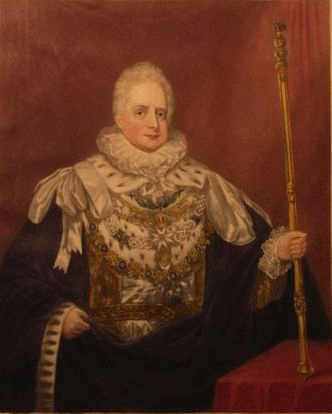
1830
William IV becomes King, his coronation taking place on 8 September 1831.

William IV becomes King, his coronation taking place on 8 September 1831.
Sir John Key, a member of Stationers' Company, is elected Lord Mayor of London.
John Key is elected Master of Stationers' Company.
John Roger Pettiward is elected Master of Stationers' Company.
Joseph Baker is elected Master of Stationers' Company.
George Woodfall is elected Master of Stationers' Company.
Charles Fourdrinier becomes Master.
The Lyceum Theatre opens. The theatre opens on 14 July, close to the Strand in the City of Westminster.
Edward London Witts is elected Master of Stationers' Company.
Thomas Chapman is elected Master of Stationers' Company.
William Barron is elected Master of Stationers' Company. He is re-elected in 1841.

Victoria becomes Queen.
Victoria is crowned Queen on 28 June.
William Francis Chapman is elected Master of Stationers' Company.
George Rowe is elected Master of Stationers' Company.
Thomas Steel is elected Master of Stationers' Company.
Charles Baldwin is elected Master of Stationers' Company. He is re-elected the following year.
This ensures copyright for books is maintained throughout the author's lifetime and for seven years posthumously, or for a full forty-two years in cases where the former situation results in a copyright period of less than forty-two years from the first publication.
Sir William Magnay, a member of Stationers' Company, is elected Lord Mayor of London.
Augustus Applegath establishes a silk and calico printing works in Dartford.
Parliament passes the Theatre Act which eases the restrictions placed upon theatres by the 1737 Licensing Act meaning that theatre's do not have to seek the Lord Chamberlain's approval for every play they stage.
Pulped-wood paper invented: Paper using cotton fibres is still used, but this process manufactures paper using wood and was simultaneously invented by the German F. G. Keller and the Canadian Charles Fenerty.
Richard Bate is elected Master of Stationers' Company.
William Carpenter is elected Master of Stationers' Company.
John Walter is elected Master of Stationers' Company.
William Magnay is elected Master of Stationers' Company.
Richard March Hoe patents his 1843 invention of the rotary printing press, having perfected it over the years.
John Lewis Cox is elected Master of Stationers' Company.
Benjamin Gibbons is elected Master of Stationers' Company.
John Bowyer Nichols is elected Master of Stationers' Company.
Thomas Gardiner is elected Master of Stationers' Company.
Thomas Taylor is elected Master of Stationers' Company.
William Farlow is elected Master of Stationers' Company.
Samuel Gyfford is elected Master of Stationers' Company.
(Baronet) Sir Francis Graham Moon, a member of Stationers' Company, is elected Lord of Mayor of London.
The Daily Telegraph and Courier is founded by Arthur B. Sleigh.
Francis Graham Moon is elected Master of Stationers' Company.
Nathaniel Graham is elected Master of Stationers' Company.
John Dickinson is elected Master of Stationer's Company. He is re-elected the following year.
George Phineas Gordon invents the Franklin press, or the "Gordon Jobber".
John Saddington is elected Master of Stationers' Company.
Henry Foss is elected Master of Stationers' Company. He is re-elected in 1862.
James William Adlard is elected Master of Stationers' Company.
The Company founds a boys' school at Bolt Cort, originally called the Stationers' Company's Foundation School
The abolition of paper duty results in cheaper mass-circulation periodicals like The Illustrated London News.
John Simpson is elected Master of Stationers' Company.
James Daikers is elected Master of Stationers' Company.
Thomas Jones is elected Master of Stationers' Company.
Edmund Hodgson is elected Master of Stationers' Company.
William Ferneley Allen, a member of Stationers' Company, is elected Lord Mayor of London.
Henry Adlard is elected Master of Stationers' Company.
Henry Good is elected Master of Stationers' Company.
Charles Robert Rivington is appointed Clerk to Stationers' Company.

The Vaudeville Theatre opens on the Strand on the 16 April.
Henry George Brown is elected Master of Stationers' Company.
William Tyler is elected Master of Stationers' Company.
Sir Sydney Hedley Waterlow, the Master of Stationers' Company, is elected Lord Mayor of London.
Francis Rivington is elected Master of Stationers' Company.
William Watson is elected Master of Stationers' Company.
William Good is elected Master of Stationers' Company.
Charles Rivington and Henry George Brown are elected Master of Stationers' Company.
William Rivington is elected Master of Stationers' Company.
George Chater is elected Master of Stationers' Company.
The City and Guilds Institute is founded, actively supported by the livery companies.
Sir Francis Wyatt Truscott, the Master of Stationers' Company, is elected Lord Mayor of London. He is also re-elected Master in 1887.
Karel Klíč invents photogravure, which enables the detailed and colour-consistent reproduction of photographs.
Theatre paper 'The Stage' is published for the first time on the 1st February.
James Figgins is elected Master of Stationers' Company.